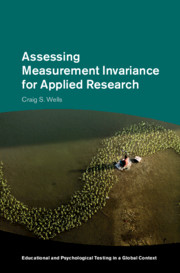Book contents
- Assessing Measurement Invariance for Applied Research
- Educational and Psychological Testing in a Global Context
- Assessing Measurement Invariance for Applied Research
- Copyright page
- Dedication
- Contents
- Figures
- Tables
- Preface
- Chapter 1 Introduction
- Chapter 2 Observed-Score Methods
- Chapter 3 Item Response Theory
- Chapter 4 Methods Based on Item Response Theory
- Chapter 5 Confirmatory Factor Analysis
- Chapter 6 Methods Based on Confirmatory Factor Analysis
- Appendix A A Brief R Tutorial
- References
- Author Index
- Subject Index
Chapter 2 - Observed-Score Methods
Published online by Cambridge University Press: 13 May 2021
- Assessing Measurement Invariance for Applied Research
- Educational and Psychological Testing in a Global Context
- Assessing Measurement Invariance for Applied Research
- Copyright page
- Dedication
- Contents
- Figures
- Tables
- Preface
- Chapter 1 Introduction
- Chapter 2 Observed-Score Methods
- Chapter 3 Item Response Theory
- Chapter 4 Methods Based on Item Response Theory
- Chapter 5 Confirmatory Factor Analysis
- Chapter 6 Methods Based on Confirmatory Factor Analysis
- Appendix A A Brief R Tutorial
- References
- Author Index
- Subject Index
Summary
What distinguishes observed-score methods from other types of method described in this book is that they typically use raw scores1 to match examinees from the reference and focal groups. As a result, there is no need to fit a latent variable model such as an IRT model (the disadvantages of using latent variable models are that they often require large sample sizes to obtain accurate parameter estimates, and they require acceptable model fit to obtain valid DIF statistics [Bolt, 2002]). Another advantage of using observed-score methods is that many of the procedures provide an effect size measure in addition to a hypothesis test. Many of the effect sizes, in fact, have well-established benchmarks that test developers and researchers can use to classify an item as exhibiting negligible, moderate, and large DIF. Because of these advantages, observed-score methods are a popular approach for testing DIF.
- Type
- Chapter
- Information
- Assessing Measurement Invariance for Applied Research , pp. 17 - 107Publisher: Cambridge University PressPrint publication year: 2021



